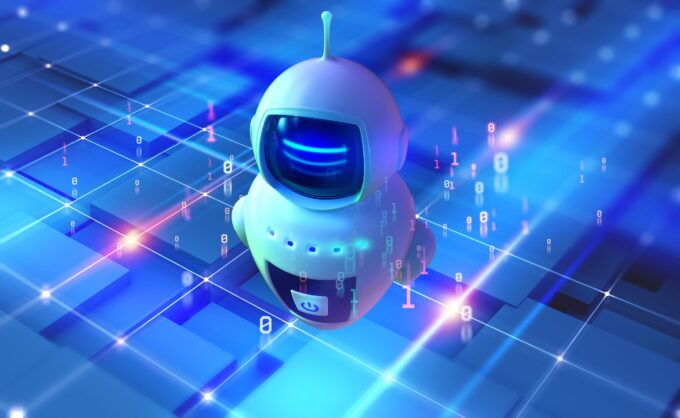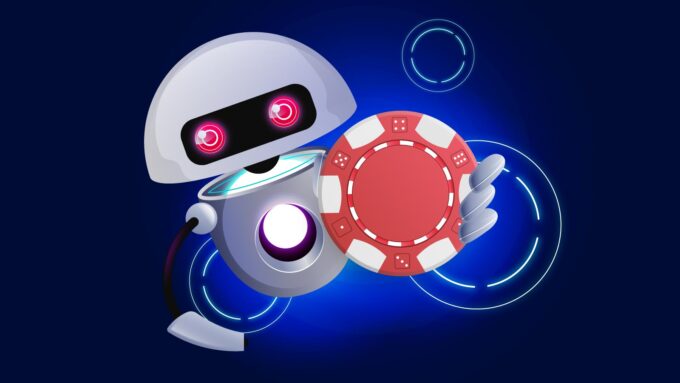The world of poker has witnessed a fascinating development in recent years, as artificial intelligence (AI) technology has advanced and poker bots have emerged as formidable opponents in online poker games. This phenomenon has sparked a lively debate within the poker community: Who reigns supreme, humans or poker bots? The clash between human skill and AI prowess has raised intriguing questions about the nature of poker, the limits of human capability, and the future of the game.
As poker bots have become increasingly sophisticated, capable of analyzing vast amounts of data and making complex calculations, they have challenged the long-held belief that poker is a game dominated by human intellect and intuition. These AI-powered entities can tirelessly play multiple tables simultaneously, devoid of emotions and biases, and execute optimal strategies based on mathematical models and algorithms.
Understanding Poker Bots

Source: it-production.com
Poker bots, also known as poker-playing software or AI opponents, are computer programs designed to play poker games autonomously. These bots utilize advanced algorithms and artificial intelligence techniques to make decisions, analyze game situations, and execute strategies without human intervention. Here are some key aspects of poker bots:
- Mathematical Precision: Poker bots excel at processing large amounts of data and performing complex calculations with speed and accuracy. They can calculate odds, probabilities, and optimal betting strategies based on mathematical models, giving them a statistical advantage over human players.
- Multitabling Abilities: One of the significant advantages of poker bots is their ability to play multiple tables simultaneously. While humans are limited by their attention span and focus, poker bots can efficiently manage multiple games, maximizing their potential for profit.
- Lack of Emotions: Unlike human players, poker bots do not experience emotions such as tilt, frustration, or fatigue. They remain consistent in their decision-making process, unaffected by external factors, which can give them an edge in long-term play.
Evolution of poker bot technology
Over the years, poker bot technology has undergone significant advancements, resulting in increasingly sophisticated AI opponents. Here are notable milestones in the evolution of poker bot technology:
- Rule-Based Systems: Early poker bots relied on predefined rules and strategies programmed by their developers. These bots had limited capabilities and were relatively easy for experienced human players to exploit.
- Machine Learning and Neural Networks: As machine learning techniques advanced, poker bots began to incorporate neural networks and reinforcement learning algorithms. These bots could learn and adapt their strategies through self-play and analysis of vast amounts of poker data.
- Game Theory and Equilibrium Strategies: Modern poker bots leverage game theory concepts and equilibrium strategies to make optimal decisions. They aim to play a theoretically unbeatable style of poker, exploiting imbalances in opponents’ strategies and adjusting their play accordingly.
Advantages of Poker Bots

One of the primary advantages of poker bots according to newsbtc is their ability to perform intricate mathematical calculations and analyses with precision. These bots can quickly calculate odds, probabilities, and optimal betting strategies based on the available data. By employing mathematical models and algorithms, poker bots can make informed decisions that maximize their expected value in the long run. Their computational power and speed give them an edge in evaluating complex game situations and identifying profitable opportunities that may go unnoticed by human players.
Unbiased decision-making and absence of emotions
Unlike human players, poker bots lack emotions and biases, making their decision-making process entirely rational and objective. Bots do not experience frustration, fear, or tilt, which can often impair human judgment. This emotional detachment allows poker bots to maintain consistency in their playstyle and stick to their predetermined strategies regardless of external factors. By eliminating the influence of emotions, poker bots can make optimal decisions based solely on mathematical analysis and probabilities, minimizing the risk of making impulsive or suboptimal moves.
Ability to play multiple tables simultaneously

Poker bots excel at multitasking, as they can effectively play multiple tables simultaneously without compromising their performance. While human players struggle to maintain focus and attention across multiple games, poker bots can analyze and make decisions across numerous tables at once. This capability gives bots a significant advantage in terms of volume and efficiency, allowing them to exploit profitable opportunities and maximize their potential profits. By playing multiple tables, poker bots can generate higher revenues and experience more hands within a given timeframe than human players can.
The Power of Human Players
Human players possess a unique advantage over poker bots with their emotional intelligence and intuition. The ability to read and interpret the emotions, body language, and facial expressions of opponents can provide valuable insights into their intentions and the strength of their hands. Humans can tap into their intuition and gut feelings, allowing them to make decisions based on subtle cues and behavioral patterns that may not be evident in raw data. This emotional intelligence gives human players an edge in bluffing, detecting bluffs, and making well-timed strategic moves that exploit their opponent’s weaknesses.
Adaptability and strategic thinking

Source: spainguidenow.com
Another significant advantage of human players is their adaptability and strategic thinking. Humans have the capacity to adjust their gameplay in response to changing circumstances, varying table dynamics, and the actions of their opponents. They can analyze and exploit the playing style, tendencies, and weaknesses of specific opponents, allowing them to formulate effective strategies and countermeasures. Human players can adapt their approach based on the flow of the game, make strategic adjustments, and devise creative tactics to gain an advantage. This adaptability and strategic thinking give humans the ability to respond flexibly to different situations and maximize their chances of success.
The Art of Deception and reading opponents
The art of deception and reading opponents is a skill that human players excel at. Bluffing, manipulating betting patterns, and using psychological tactics to mislead opponents are integral aspects of poker that require a deep understanding of human behavior. Humans can employ various strategies to deceive their opponents, such as acting weak when strong or vice versa, controlling their body language, and manipulating their speech and demeanor. Additionally, human players can observe and analyze their opponents’ behavior, betting patterns, and physical tells to gain insights into their hand strength and intentions. The ability to accurately read opponents and adapt one’s gameplay accordingly is a potent weapon in the hands of skilled human players.
Clash of Titans: Humans vs. Poker Bots

Source: casino.org
Over the years, there have been several high-profile clashes between human players and poker bots that have captivated the poker community. These battles serve as a platform to test the capabilities of both humans and bots, showcasing their respective strengths and weaknesses. From the famous showdown between professional poker player Phil Laak and the Polaris poker bot to the annual Computer Poker Competition, these encounters highlight the ongoing quest to determine who truly reigns supreme in the poker arena.
Strategies employed by top human players to counter bots
Top human players have developed strategies to counter the advanced algorithms and calculations of poker bots. One approach is to introduce unpredictability and randomness into their gameplay, making it challenging for the bots to accurately analyze their decision-making process. Human players may vary their bet sizing, timing, and frequency of bluffing to keep the bots off-balance and prevent them from exploiting patterns.
Another strategy is to focus on exploiting the weaknesses of the poker bot’s programming. By identifying specific patterns or tendencies in the bot’s play, human players can develop counterstrategies that exploit these vulnerabilities. These strategies often involve making unconventional moves or taking calculated risks to throw the bot off its optimal decision-making path.
The Impact of poker bots on the online poker ecosystem
The presence of poker bots in the online poker ecosystem has had a significant impact on the game. On one hand, bots can increase the overall skill level of players by providing challenging opponents that require advanced strategies to defeat. Bots also contribute to the liquidity of online poker platforms, ensuring a steady flow of games and players.
However, the use of bots also raises concerns about fairness, integrity, and the potential for cheating. Poker sites employ various measures to detect and combat bot usage, including sophisticated algorithms, player reports, and manual investigations. Striking a balance between allowing bots for a competitive environment and ensuring a level playing field for human players remains an ongoing challenge for online poker platforms.
Ethical and Regulatory Considerations

The presence of poker bots raises ethical concerns regarding the fairness and integrity of online poker. The use of bots can create an uneven playing field, as they have the potential to gain an unfair advantage over human players. This challenges the fundamental principles of fairness and equality that are vital to maintaining the integrity of the game.
Measures taken by poker platforms to detect and combat bots
To uphold fairness and combat the use of bots, online poker platforms employ various measures. Sophisticated algorithms and artificial intelligence systems are used to detect suspicious patterns of play that may indicate bot activity. Player reports and manual investigations also play a crucial role in identifying and addressing potential bot usage. By continuously monitoring gameplay and improving detection methods, poker platforms strive to maintain a level playing field for all participants.
Legal Implications and responsible gaming
The use of poker bots can have legal implications, depending on the jurisdiction and the specific terms and conditions set by the poker platforms. In some regions, the use of bots may be explicitly prohibited and considered a violation of the platform’s terms of service. Additionally, responsible gaming initiatives emphasize the importance of fair play and discourage the use of automated tools that undermine the integrity of the game. Players are encouraged to adhere to ethical practices and play responsibly, fostering a safe and enjoyable poker environment for all.
Finding Common Ground

Rather than viewing humans and poker bots as adversaries, there is potential for collaboration and synergy. Collaborative efforts between humans and artificial intelligence can lead to advancements in poker strategy and gameplay. Human players can learn from the analytical capabilities of bots, gaining insights into optimal decision-making and refining their own strategies. By working together, humans and AI can push the boundaries of poker knowledge and elevate the level of play.
The potential for hybrid poker playing: humans aided by bots
The concept of hybrid poker playing involves humans being aided by poker bots during gameplay. This approach leverages the strengths of both humans and bots, combining human intuition, adaptability, and strategic thinking with the computational power and mathematical analysis of bots. By collaborating with bots, human players can enhance their decision-making processes and potentially achieve higher levels of success in the game.
Leveraging AI for player training and skill development
Artificial intelligence can be a valuable tool for player training and skill development. AI-powered platforms and software can simulate various poker scenarios, providing players with opportunities to practice and refine their strategies. By analyzing gameplay data and offering personalized feedback, AI systems can help players identify weaknesses, improve their decision-making abilities, and enhance their overall poker skills.
The Future of Poker: Harmonious Coexistence?

Source: natural8.com
The rapid advancements in AI technology have significant implications for the future of poker. As AI algorithms continue to improve, poker bots are becoming increasingly sophisticated and capable of challenging even the most skilled human players. This raises questions about the balance of power between humans and machines in the poker landscape. With continued advancements in AI, we can expect poker bots to become even more formidable opponents, requiring human players to adapt and evolve their strategies.
The evolving role of humans in the poker landscape
While AI has proven its prowess in poker, the role of humans remains vital. Human players bring unique qualities to the game, such as intuition, creativity, and the ability to read and deceive opponents. These human elements add depth and excitement to the game, creating a dynamic and engaging experience for players and spectators alike. Despite the rise of poker bots, human players will continue to play a crucial role in shaping the future of poker.
Anticipated changes in the poker industry
The rise of AI and poker bots is likely to influence the poker industry in various ways. Poker platforms and casinos may need to implement stricter regulations and detection systems to combat cheating through the use of bots. Additionally, the integration of AI technology into poker training and coaching programs is expected to become more prevalent, allowing players to enhance their skills and adapt to the changing landscape. As AI continues to evolve, we may also witness new variations of the game that combine human and AI elements, creating novel and exciting playing experiences.
Conclusion
The clash between poker bots and human players has sparked a fascinating debate within the poker community. While poker bots exhibit remarkable mathematical prowess, unbiased decision-making, and the ability to play multiple tables simultaneously, human players possess a unique set of skills, including emotional intelligence, adaptability, and the art of deception. The battle between humans and poker bots has witnessed historic competitions and strategic countermeasures employed by top players.







